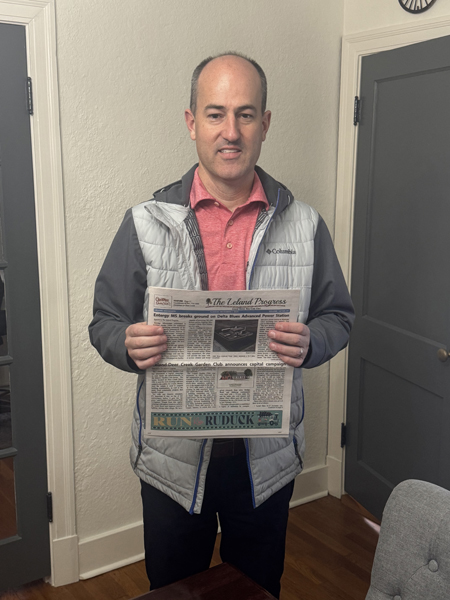Clay Mansell Purchases Longtime Publication
Over the past four years, Clay Mansell has been first-time elected to the Mississippi House of Representatives (District 56); held leadership posts at the Clinton Chamber, Main Street Clinton, Hinds Community College Foundation Board, and Mississippi College Alumni Association; and has managed Twisted Pretzels, Dippin Dots, and Panda Properties as a serial entrepreneur. During this time, he and his wife, Amanda, fostered eleven children while also raising their own two and adopting one. Plus, he found time to acquire nine local newspapers around Mississippi.
So why not add a tenth newspaper to the stable of Our Hometown Papers with one of the oldest local publications in the Delta, dating back to 1888?
“We contacted Stephanie (Patton, owner of The Leland Progress) in July, when she was closing down and immediately came up with a plan to acquire the newspaper,” says Mansell, who owns publications with Dr. Ryan Tracy, a dentist in Clinton.
Residents in Washington County, home of The Leland Progress, and newspaper folks across the state lauded the move. Especially Patton, who compared the community losing its newspaper as one losing “its voice.”
The local newspaper was birthed as Leland Record in 1888, changed to the Leland Times in 1889, and Leland Enterprise in 1897. It went out of print during World War II, and was resuscitated in 1944, when W.R.Wilkins published the inaugural issue of The Leland Progress.
When Patton took over in 2011, The Leland Progress, anchored in a town of 3,500 people, had some 800 subscribers and newspaper buyers. After doing it all for the last seven or eight years—reporter, editor, photographer, graphic designer, circulation manager, and ad sales manager— her accountant pointed out how much money Patton was losing on the newspaper. Subscribers and newspaper buyers had dropped by half, with 250 print subscribers, 100 digital subscribers, and 50 newsstand sales weekly.
“We make money on our local newspapers,” says Mansell. Since 2010, his collection of Mississippi hyperlocal newspapers for Mayberry-esque towns include the twice-monthly Clinton Courier and seven other monthlies: Canton News, Florence News, Long Beach Breeze, Pearl News, Pelahatchie News, Richland News, and Wesson News. Also published: The Bolton News, The Pass Post, and Mississippi Monitor magazine, all under the task of providing “good news you can use.”
“Some people think you can’t make local newspapers profitable, but we’ve found a business model that supports local communities and helps promote and grow their businesses,” he says. “It’s so important to local communities to have a voice, some sense of connection, and local government accountability.”
Beginning in October, Mansell began printing triple the number of papers the first week of the month of the revived The Leland Progress, unlocked the website so the paper could be read free online, and therefore expand the reach of local businesses’ advertising opportunities. The newspaper’s website is updated routinely with fresh content; email blasts are being implemented; and social media has been expanded. The print publication may increase in frequency with community and advertiser support.
The numbers to date: 3,750 readers of the printed paper; more than 5,000 online visitors monthly. The Leland Progress is available by subscription and to pick up free at more than fifty locations.
A vital part of the model of each small-town newspaper is having a part-time editor who lives in the community and knows it intimately, Mansell said.
For instance, new The Leland Progress Editor Keri Baldwin works closely with the director of the Leland Chamber of Commerce, among other local collaborations.
“She was already very involved with the town before we hired her, which is more beneficial in our book than having a journalism background,” he says. “If they’re involved, they know which alderman to call for what issue, what’s coming up, what people want to read about.”
Baldwin wrote October 8 in the The Leland Progress: “Did I ever think that my path would be one of journalism? Never, but the good Lord had other plans. I hope to continue with the momentum set by my predecessors, and to maintain one of the most important, but oh-so-rare qualities of news: positivity. That’s what The Leland Progress is to me.”
Accountability to local government is vital, says Mansell.
“When my local person sits in a town board meeting, it makes a difference than if no reporter is in the room,” says Mansell. “Even though we’re not going to slam them the next day, just by being there, it keeps the scales level.”
Mansell also does back-end work for local publishers, such as graphic design and website management. “There’s one publisher who functions as the writer and sales rep. She sends us the ads, and it’s her paper completely,” he says. “We gave her an upfront price of what it would cost to print the papers, so she writes one check to us, and we handle it all.”
The Clinton Courier, the first newspaper Mansell acquired, “just fell into our laps,” he says. “I was chamber president when the previous paper, the Clinton News, closed. We were trying to recruit a paper to town, and it wasn’t going well. I basically told the mayor (Rosemary Aultman) I could do it, half kidding, and she goes, well, go do it!”
Mansell purposely sought out Pelahatchie next, then created three papers out of the next acquisition: Southwest Rankin News. Other locations followed in various ways.
After relaunching The Leland Progress, publishers considering closing their doors have contacted him. “I tell them I’ve got a lot going on, and I’d really rather help them make money than me take over,” says Mansell.
Mansell is tickled by the story that, as an added benefit to publishing local newspapers, refrigerators are no longer naked.
“We’re covering news that nobody else is going to, like the good citizen of the month at the local elementary school,” he says. “Someone told us, ‘Now we can cut out articles again and hang them on the refrigerator!’”

